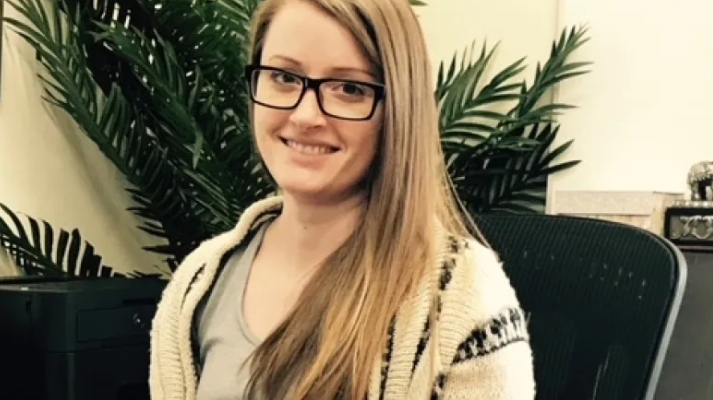Alberta woman expected a 6-month wait for surgery. Two painful years later, she’s still waiting

‘It makes me feel insignificant,’ says woman awaiting surgery for scoliosis
A woman in northeastern Alberta has been waiting in pain for almost two-and-a-half years to get a surgery that would correct a severe curvature of her spine.
“It’s been getting progressively worse over the years,” said Sarah MacPhail, a therapist and clinical social worker in Cold Lake, Alta., 300 kilometres northeast of Edmonton.
MacPhail was a teenager when she was diagnosed with scoliosis, where the spine is curved from side to side. In cases with substantial curvature — an S-or C-shape — it can contribute to chronic pain and breathing issues.
In 2019, a doctor said she’d be a good candidate for spinal surgery to correct it but to expect a six-month wait. She went on the wait-list for spinal surgery in July 2020.
Now, more than two years later, MacPhail says she has stalled at number nine on the waiting list. Her symptoms — chronic headaches, back and neck pain, breathing issues, limited mobility and fatigue — have gotten worse, requiring her to take medical leave from work.
“The pain has been increasing, the curves have been increasing,” she said.
“I have really severe headaches on a regular basis, to the point that I just have to sit in the dark and not do anything at all for about 24 hours at a time.”
‘Too long’
Alberta Health Services (AHS) said it can’t comment specifically on MacPhail’s case. However, AHS spokesperson Kerry Williamson said he has been told a wait time of 2½ years would be an anomaly.
A statement from AHS noted that once a decision has been made to proceed with elective back surgery, AHS works to book the surgeries to take place within six to 12 months. A website that reports wait times for surgeries notes that, as of October, 90 per cent of Albertans needing surgical procedures on the spine or back waited about 52 weeks.
“We know that in some areas, wait-lists for surgeries are too long,” said the statement. “That is why we are putting significant focus on completing more surgeries, and we are seeing success in that regard.”

Alberta uses a tool that provides information to surgeons about which patients “are the sickest and need surgery urgently” to help prioritize the wait-list, AHS said.
AHS said delays for surgery can be due to many factors, including changes in the patient’s condition or availability of patients and surgeons.
The wait-list for adults is currently 70,225, compared to about 68,000 in February 2020.
“We’re funding more surgeries — including more orthopedic surgeries in chartered surgical facilities — to free up operating rooms and surgery beds in hospitals for more-complex surgeries like this one,” Steve Buick, press secretary for Health Minister Jason Copping, told CBC News.
“We feel for patients who are waiting too long and we try to ensure anyone who contacts our office gets any information they need from AHS or another service provider, but we have no role in clinical decisions on care of individual patients.”
Risks of delay
There are risks in delaying scoliosis corrective surgery, said Dr. Kathryn Birnie, a pain expert at the University of Calgary.
“You have a huge impact having to wait long periods of time for surgery, especially if you’re living with pain before surgery,” Birnie said.
Waiting for treatment without appropriate pain management can increase the risk of developing chronic pain before the surgery — and that can negatively impact the recovery process, said Birnie.
“If you don’t have chronic pain before spinal fusion surgery, it’s still a surgery that is the onset of chronic pain for some people,” she said. “If you have chronic pain before the surgery, you are at increased risk of continuing to have chronic pain and potentially worsened pain after your surgery.”
Birnie said the provincial and federal governments have made some progress improving accessibility and treatment options for those living with pain, but there is still work to be done.
“Chronic pain is still under-recognized as a public health emergency and as a public health issue in terms of the number of people in Canada it impacts and the cost,” said Birnie.
“Because it isn’t life-threatening and because pain is invisible and has a lot of this stigma attached to it, it’s often dismissed and ignored.”
‘Makes me feel insignificant’
MacPhail said she has reached out to her surgeon, Alberta Health Services, her MLA and the Alberta health minister, hoping to receive answers on why her surgery has been delayed.
She said each level has directed her elsewhere, ultimately leaving her with no answers or solutions.
“It makes me feel insignificant. It makes me feel like what I’m going through is not valid, it’s not important enough,” said MacPhail.
“It makes me feel very hopeless and it makes me feel like an inconvenience because now I’m bothering people.”
Related News
Canadians required to register with U.S. government if in country at least 30 days
Many Canadians travelling to the United States will now have to newly register with theRead more
Duty-free shops struggle to make ends meet as Canadians steer clear of U.S.
If business doesn’t pick up soon at his duty-shop, Éric Lapointe says he’s going toRead more
